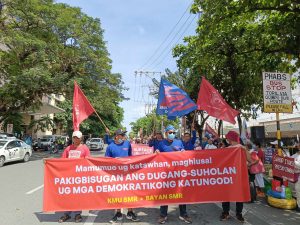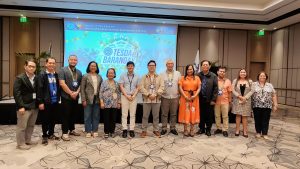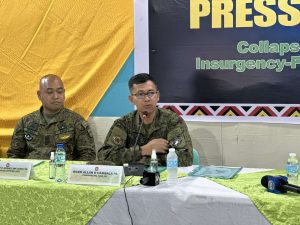The Government and National Democratic Front (NDF) peace panels signed an agreement on Saturday in Utrecht to recommend the declaration of ceasefire from midnight of Dec. 23, 2019 to 12:59 p.m. on Jan. 7, 2020.
According to the three-page Joint Statement signed in Utrecht on Dec. 21, the government and NDF “hereby announce that they have agreed to recommend to their respective Principals the issuance of a unilateral and reciprocal nationwide ceasefire effective form 00 0H of 23 December 2019 to 2359 H of 07 January 2020.”
The parties agreed to “separately issue the corresponding ceasefire orders.”
During the ceasefire period, “the respective armed units and personnel of the Parties shall cease and desist from carrying out offensive military operations against the other,” the agreement states.
The ceasefires, the parties agreed, are “intended to generate a positive environment conducive to the holding of informal talks preparatory to the formal meeting to resume the peace negotiations.”
“These shall be measures of goodwill and confidence building during the traditional celebrations of Christmas and New Year holidays,” the parties said.
The agreement was signed for the government by Labor Secretary Silvestre Bello III who was peace panel chair in the negotiations with the NDF until Duterte called it off in November 2017, and Hernani Braganza, former Agrarian Reform Secretary and member of that panel.
For the NDF, the signatories were Luis Jalandoni, Senior Adviser of the NDF negotiating panel, and Fidel Agcaoili, chair of the NDF negotiating panel.
Signing as witness is Kristina Lie Revhaim, Third Party Facilitator from the Norwegian government.
There is no confirmation as yet if the President has approved the recommendation.
Presidential spokesperson Salvador Panelo told DZBB in an interview at 8 a.m. Sunday morning that “mayroong rekomendasyon pero hindi pa natin alam kung aaprubahan ni Presidente” (there is a recommendation for ceasefire but we still do not know if President Duterte will approve it).
“Last card”
Duterte sent Bello to Utrecht two weeks ago to talk with NDF consultant Jose Ma. SIson as his “last card” for peace.
Duterte on Dec. 5 announced in Legazpi City during the Situation Briefing on the Effects of Typhoon ‘Tisoy’ in the Bicol Region that he was sending Bello to Utrecht to talk with the NDF leadership. The NDF represents the Communist Party of the Philippines (CPP) and New People’s Army (NPA) in the peace negotiations.
“Now, this is the first time that I will reveal it. I’m sending Secretary Bello…. So he should go there. Talk to them and… My… I cannot —I cannot talk about it basta he…I’m sending him back to Sison and talk to him about… Malaman lang ninyo ‘yan pagka — pagdating ng panahon (You’ll find out when the time comes),” Duterte said.
“If (Sison) agrees, ito ang sabi – sabi ko last card (this is what I say – my last card). When I say my last card is — my time is running out,” Duterte added.
Bello did not give details on what transpired during the Dec. 7 and 8 meeting in Utrecht.
“Cautioned enthusiasm”
In a statement Sunday, Bayan Muna Rep. Carlos Isagani Zarate, House Deputy Minority Leader, welcomed with “cautioned enthusiasm” the joint statement on a possible unilateral and national reciprocal ceasefires between the government and the NDF as “this certainly will augur well in creating the favorable environment necessary for the resumption of the cancelled peace talks between the GRP and NDFP, which is long awaited by our people.”
Zarate said they call on both parties to “resume the talks in earnest without preconditions and based on previously signed and binding agreements.”
But he warned against “militarists and saboteurs” who, he said, will “do everything to prevent a political, just and lasting solution to the more than five-decade old armed rebellion in our country.”
He said the saboteurs in the past, “especially from the security sector, used undermining schemes like implementation of so-called ‘legitimate police operations against criminals’ as cover for counterinsurgency operations during the ceasefire period. They also used paramilitary groups as proxies in these counterinsurgency operations.”
“There’s a lot more to be done,” he said as he called on both parties to “stay the course and always consider the primordial interests of our country and people as their guide.”
“Very positive step”
Balay Mindanaw, in a statement, said the Joint Statement is a “very positive step” towards the resumption of the GRP-NDF peace talks.
“We commend both parties for going the exra mie in an effort to revive the formal peace negotiations,” Balay Mindanaw said, adding they appreciate the parties’ “listening to the voices from the communities that have been longing for just and lasting peace in our land.”
Balay Mindanaw urged the principals of the two parties “to take to heart and heed the recommendations.”
“We hope that this becomes an irreversible step towards the transformation of this decades-old armed conflict as the two parties resume their wokr in addressing hte roots of the conflict.”
“Doors must be open always”
Duterte terminated the peace negotiations with the NDF through Proclamation 360 on Nov. 23, 2017 just as the government peace panel was on its way to Utrecht supposedly for another round of talks.
On Dec. 5, 2017, he signed Proclamation 374 designating the CPP-NPA as a terrorist group.
A year later, on Dec. 4, 2018, Duterte issued Executive Order No. 70 “institutionalizing the whole-of-nation approach in attaining inclusive and sustainable peace, creating a National Task Force to end Local Communist Armed Conflict, and directing the adoption of a National Peace Framework.”
The EO institutionalized Duterte’s preference for “localized peace talks.”
Before announcing in Legazpi that he was sending Bello to Utrecht, Duterte explained that “there can never be a statement that would end finality (sic) in everything that you say in public.”
He acknowledged that he said “That’s it, I do not want to talk to you guys, Forget it,” but added, “I cannot stop. Hindi ko pwedeng sabihin, ‘Ayaw ko na makipag-usap’ (I cannot just say I don’t want to talk anymore). That is not a statement of a leader, of a President.”
He said he expects the military would react to this move “but you know you should understand that the quest for — the longing for peace is always there. And not for the military and the police but for everybody. Kailangan — the doors must be open always or the — there must be at least one channel if everything closes na pwede mong pakiusapan (that you can talk with).
As of 3 p.m. Sunday, there has been no confirmation if President Duterte approved the recommendation. (Carolyn O. Arguillas / MindaNews)




